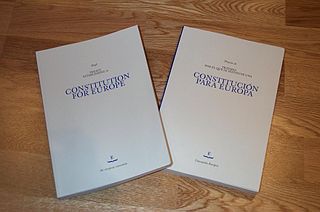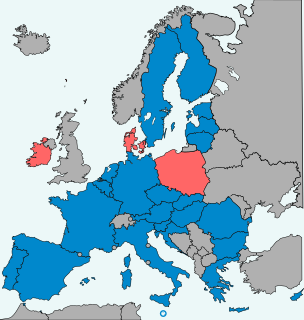Related Research Articles

The Treaty of Nice was signed by European leaders on 26 February 2001 and came into force on 1 February 2003.

Valéry René Marie Georges Giscard d'Estaing, also known as Giscard or VGE, was a French politician who served as President of France from 1974 to 1981.

The Treaty establishing a Constitution for Europe was an unratified international treaty intended to create a consolidated constitution for the European Union (EU). It would have replaced the existing European Union treaties with a single text, given legal force to the Charter of Fundamental Rights, and expanded qualified majority voting into policy areas which had previously been decided by unanimity among member states.

A referendum was expected to take place in the United Kingdom in 2006 to decide whether the country should ratify the proposed Treaty establishing a Constitution for Europe. However, following the rejection of the Constitution by similar referendums in France in May 2005 and the Netherlands in June 2005, the UK vote was postponed indefinitely. The question was thought to have been settled when the constitution was superseded by the Treaty of Lisbon, which Parliament ratified in 2008 without holding a referendum.
The Tenth Amendment of the Constitution Act 1987 is an amendment to the Constitution of Ireland that permitted the state to ratify the Single European Act. It was approved by referendum on 26 May 1987 and signed into law on 22 June of the same year.
The Twenty-sixth Amendment of the Constitution Act 2002 is an amendment of the Constitution of Ireland which permitted the state to ratify the Treaty of Nice. It was approved by referendum on 19 October 2002 and signed into law on 7 November of the same year. The amendment followed a previous failed attempt to approve the Nice Treaty which was rejected in the first Nice referendum held in 2001.

This is a list of referenda related to the European Union, or referendums related to the European Communities, which were predecessors of the European Union. Since 1972, a total of 48 referenda have been held by EU member states, candidate states, and their territories, with several additional referendums held in countries outside of the EU. The referendums have been held most commonly on the subject of whether to become a member of European Union as part of the accession process, although the EU does not require any candidate country to hold a referendum to approve membership or as part of treaty ratification. Other EU-related referendums have been held on the adoption of the euro and on participation in other EU-related policies.

A consultative referendum on the Treaty establishing a Constitution for Europe was held in the Netherlands on 1 June 2005 to decide whether the government should ratify the proposed Constitution of the European Union. The result was a "No" vote.

The French referendum on the Treaty establishing a Constitution for Europe was held on 29 May 2005 to decide whether France should ratify the proposed Constitution of the European Union. The result was a victory for the "No" campaign, with 55% of voters rejecting the treaty on a turnout of 69%.
The Portuguese referendum on the Treaty establishing a Constitution for Europe was a planned referendum to be held on October 9, 2005 to decide whether the Portugal should ratify the proposed Constitution of the European Union.
The Twenty-fourth Amendment of the Constitution Bill 2001 was a proposed amendment to the Constitution of Ireland to allow the state to ratify the Treaty of Nice of the European Union. The proposal was rejected in a referendum held in June 2001, sometimes referred to as the first Nice referendum. The referendum was held on the same day as referendums on the prohibition of the death penalty and on the ratification of the Rome Statute of the International Criminal Court, both of which were approved.

In general, the law of the European Union is valid in all of the twenty-seven European Union member states. However, occasionally member states negotiate certain opt-outs from legislation or treaties of the European Union, meaning they do not have to participate in certain policy areas. Currently, three states have such opt-outs: Denmark, Ireland and Poland. The United Kingdom had four opt-outs before leaving the Union.

The European Referendum Campaign (ERC) was an independent, Europe-wide, cross party network of NGOs and individuals which intended to bring together campaigners to fight for democratic development within the European Union. Its sole objective was to gain as many referendums on the 2007 EU Lisbon Treaty in as many EU member states as possible. The ERC was supported by the NGO Mehr Demokratie, and by Democracy International, a split-off of Mehr Demokratie, whose people also created the European Citizens' Initiative. The ERC cooperated with the European political party EUDemocrats – Alliance for a Europe of Democracies, as inspired and presided by Jens-Peter Bonde.

The Twenty-eighth Amendment of the Constitution Bill 2008 was a proposed amendment to the Constitution of Ireland that was put to a referendum in 2008. The purpose of the proposed amendment was to allow the state to ratify the Treaty of Lisbon of the European Union.

The Twenty-eighth Amendment of the Constitution Act 2009 is an amendment of the Constitution of Ireland which permitted the state to ratify the Treaty of Lisbon of the European Union. It was approved by referendum on 2 October 2009.

The Treaty of Lisbon is an international agreement that amends the two treaties which form the constitutional basis of the European Union (EU). The Treaty of Lisbon, which was signed by the EU member states on 13 December 2007, entered into force on 1 December 2009. It amends the Maastricht Treaty (1992), known in updated form as the Treaty on European Union (2007) or TEU, as well as the Treaty of Rome (1957), known in updated form as the Treaty on the Functioning of the European Union (2007) or TFEU. It also amends the attached treaty protocols as well as the Treaty establishing the European Atomic Energy Community (EURATOM).
Campaign Against an EU Constitution (CAEUC) was a coalition left-wing political parties, organisations, trade unionists and individuals in Ireland, formed in 2005 to campaign against the anticipated European Union Constitution referendum. The Irish referendum on the issue did not materialise when the constitution was rejected in a constitutional referendum in France and a consultative referendum in the Netherlands

The ratification of the Treaty of Lisbon was officially completed by all member states of the European Union on 13 November 2009 when the Czech Republic deposited its instrument of ratification with the Italian government. The Lisbon Treaty came into force on the first day of the month following the deposition of the last instrument of ratification with the government of Italy, which was 1 December 2009.

The history of the European Union from 2004 to the present is the current timeline of the European union. It is a period of significant upheaval and reform following the 2004 enlargement of the European Union. The EU has taken on ten new members, eight of which were initially much poorer than the EU average, and took in a further two in 2007 with many more on the way. It created the euro a few years before and had to expand this, and the Schengen Area to its new members. However this was overshadowed by the late-2000s recession and damaging disputes over the European Constitution and its successor, the Treaty of Lisbon. Throughout this period, the European People's Party has been the largest group in the European Parliament and provides every President of the European Commission.

The Treaty of Accession 1972 was the international agreement which provided for the accession of Denmark, Ireland, Norway and the United Kingdom to the European Communities. Norway did not ratify the treaty after it was rejected in a referendum held in September 1972. The treaty was ratified by Denmark, Ireland and the United Kingdom who became EC member states on 1 January 1973 when the treaty entered into force. The treaty remains an integral part of the constitutional basis of the European Union.
References
- ↑ "Majority would reject treaty in EU poll". The Irish Times . 14 June 2005. Archived from the original on 12 October 2012.
- ↑ "La boîte à outils du traité de Lisbonne, par Valéry Giscard d'Estaing". Le Monde. 26 October 2007.
- ↑ "The EU Treaty is the same as the Constitution". The Independent. 30 October 2007.
- ↑ "Lisbon No campaign was 'dishonest' in misusing his quote, says Giscard". The Irish Times . 26 June 2008.
- ↑ "Ireland rejects Lisbon Treaty". RTÉ News . 13 June 2008.
- ↑ "Ireland votes Yes to Lisbon Treaty". RTÉ News . 3 October 2009. Retrieved 5 October 2009.